|
Books Should Be Free Loyal Books Free Public Domain Audiobooks & eBook Downloads |
|
|
Books Should Be Free Loyal Books Free Public Domain Audiobooks & eBook Downloads |
|
Adventure Books |
|---|
|
Book type:
Sort by:
View by:
|
By: Eleanor Luisa Haverfield (1870-) | |
|---|---|
 Queensland Cousins
Queensland Cousins
| |
By: Elijah Kellogg (1813-1901) | |
|---|---|
 Lion Ben of Elm Island
Lion Ben of Elm Island
An adventure story for boys, in which the author aims to "impart pleasure, and, at the same time, inspire respect for labor, integrity and every noble sentiment". There is a sense of nostalgia, as Kellogg sets his story in bygone days, when the grandfathers of his readers were mere boys, facing the challenges and perils of frontier life and developing the character needed to transform the wilderness in to the land of freedom and plenty. - Summary by Lynne Thompson | |
By: Elizabeth Gaskell (1810-1865) | |
|---|---|
 Moorland Cottage
Moorland Cottage
"Maggie Brown is torn between her mother who constantly tells her to live for her selfish brother (to whom she gives all her love) to her wish to marry Frank and live for herself. Maggie's plight for independence shows the change in women's role, which started to take place during that time. But it also keeps to the tradition of an almost Cinderella story: the pure woman does the best for everyone but herself and is rewarded for that. In addition, this is a very interesting story, written in Gaskell's remarkable style. When you read it, you are transported to another time, and place". | |
By: Elizabeth Gerberding (1857-1902) | |
|---|---|
 Golden Chimney: A Boy's Mine
Golden Chimney: A Boy's Mine
Ben Ralston regrets that he was born 40 years too late to take advantage of the California Gold Rush. Opportunities are dwindling, but for a boy with drive, they are not extinct. - Summary by Lynne Thompson | |
By: Ellen C. Babbitt (1872-) | |
|---|---|
 More Jataka Tales
More Jataka Tales
The continued success of the "Jataka Tales," as retold and published ten years ago, has led to this second and companion volume. Who that has read or told stories to children has not been lured on by the subtle flattery of their cry for "more"? The Jataka tales, regarded as historic in the Third Century B. C., are the oldest collection of folk-lore extant. They come down to us from that dim far-off time when our forebears told tales around the same hearth fire on the roof of the world. | |
By: Emerson Hough (1857-1923) | |
|---|---|
 Covered Wagon
Covered Wagon
"Look at 'em come, Jesse! More and more! Must be forty or fifty families." This is an old-fashioned adventure tale set on the Oregon Trail, just before the California Gold Rush. It is the story of a wagon train bound for the west, and the conflict which arises due to of a love triangle. Indian fights, buffalo hunts, dangerous river crossings and other dangers of the trail add to a gripping and entertaining yarn. | |
By: Emma Orczy (1865-1947) | |
|---|---|
 The League of the Scarlet Pimpernel
The League of the Scarlet Pimpernel
Written by Baroness Orczy and first published in 1919, The League of the Scarlet Pimpernel is a sequel book to the classic adventure tale, The Scarlet Pimpernel. The book consists of eleven short stories about Sir Percy Blakeney’s exploits in rescuing various aristos and French citizens from the clutches of the guillotine. The stories which are listed below, are set in 1793 but appear in no particular order. They occasionally refer to events in other books in the series. | |
By: Ernest Glanville (1855-1925) | |
|---|---|
 In Search of the Okapi A Story of Adventure in Central Africa
In Search of the Okapi A Story of Adventure in Central Africa
| |
By: Ernest Shackleton | |
|---|---|
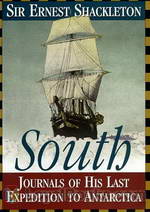 South! The Story of Shackleton's Last Expedition 1914-1917
South! The Story of Shackleton's Last Expedition 1914-1917
The expedition was given the grand title of The Imperial Trans-Antarctic Expedition. Due to be launched in 1914, two ships were to be employed. The first, the lead vessel, fittingly named the Endurance was to transport the team to the Weddell Sea from where the great explorer Ernest Shackleton and five others would cross the icy wastes of Antarctica on foot. The second ship, the Aurora was to approach the continent from the other side and put down supplies at various points to help the explorers... | |
By: Ernest Thompson Seton | |
|---|---|
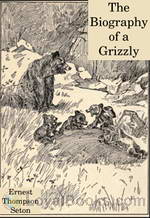 The Biography of a Grizzly
The Biography of a Grizzly
I first read this little book when I was in the fifth grade, and now more than fifty years later, I still find it fascinating. Ernest Thompson Seton was a man with a concern for nature her creatures and an excellent story teller. I could almost feel Wahb, the great grizzly’s pain and frustration as he tried to avoid contact with humans and just be left alone to carry out his bear business. Listening to this audio book will be an hour and a half well spent.Summary by Mike Vendetti, Narrator. | |
By: Ernest William Hornung (1866-1921) | |
|---|---|
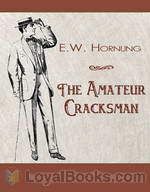 The Amateur Cracksman
The Amateur Cracksman
“I’d tasted blood, and it was all over with me. Why should I work when I could steal? Why settle down to some humdrum uncongenial billet, when excitement, romance, danger and a decent living were all going begging together” – A. J. Raffles, The Ides of March. | |
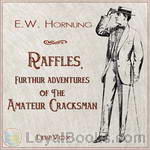 Raffles, Further Adventures of the Amateur Cracksman
Raffles, Further Adventures of the Amateur Cracksman
Raffles, Further Adventures of the Amateur Cracksman (also published as The Black Mask) is the second collection of stories in the Raffles series. After the dark turn of events at the end of The Gift of the Emperor, Bunny’s done his time and, his life not being quite what it was before, now finds himself longing for the companionship of his Raffles. | |
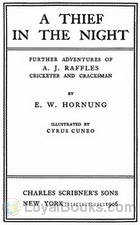 A Thief in the Night
A Thief in the Night
Gentleman thief A.J. Raffles burgles his way through a series of homes in late Victorian England. A Thief in the Night is a short story collection and Hornung's third book in the Raffles series. | |
 Mr. Justice Raffles
Mr. Justice Raffles
A. J. Raffles is a British gentleman thief of some renown who, in this, the hero's final adventure, ironically demonstrates a sense of morality by teaching a London East End loan shark a lesson. The book was later made into a movie, as well as a British television series. | |
By: Erskine Childers (1870-1922) | |
|---|---|
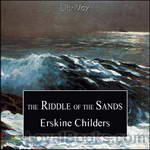 The Riddle of the Sands
The Riddle of the Sands
Containing many realistic details based on Childers’ own sailing trips along the German North Sea coast, the book is the retelling of a yachting expedition in the early 20th century combined with an adventurous spy story. It was one of the early invasion novels which predicted war with Germany and called for British preparedness. The plot involves the uncovering of secret German preparations for an invasion of the United Kingdom. It is often called the first modern spy novel, although others are as well, it was certainly very influential in the genre and for its time... | |
By: Ethel C. Pedley (1859-1898) | |
|---|---|
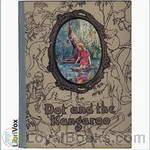 Dot and the Kangaroo
Dot and the Kangaroo
Dot and the Kangaroo, written in 1899, is a children’s book by Ethel C. Pedley about a little girl named Dot who gets lost in the Australian outback and is eventually befriended by a kangaroo and several other marsupials. | |
By: Ethel Twycross Foster (1881-1963) | |
|---|---|
 Little Tales of the Desert
Little Tales of the Desert
A six year-old girl named Mary spends Christmas vacation with her parents in the Arizona desert of 1901 or thereabouts. | |
By: Eugène Sue (1804-1857) | |
|---|---|
 The Mysteries of Paris, Volume 1
The Mysteries of Paris, Volume 1
The Mysteries of Paris (French: Les Mystères de Paris) is a novel by Eugène Sue which was published serially in Journal des débats from June 19, 1842 until October 15, 1843. Les Mystères de Paris singlehandedly increased the circulation of Journal des débats. There has been lots of talk on the origins of the French novel of the 19th century: Stendhal, Balzac, Dumas, Gautier, Sand or Hugo. One often forgets Eugène Sue. Still, The Mysteries of Paris occupies a unique space in the birth of this... | |
By: Evans, A. J. (1889-1960) | |
|---|---|
 The Escaping Club
The Escaping Club
Described by some as one of the greatest escape books published. The Escaping Club recounts Evans' escape to Switzerland from a supposedly "escape-proof" German prison camp during World War I. After repatriation and rejoining the war, Evans again finds himself captured, this time first by Arabs and then by Turks. He again manages to escape. A detailed look at the trials faced by Allied POWs during World War I. | |
By: F. Marion Crawford | |
|---|---|
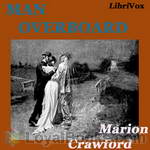 Man Overboard
Man Overboard
Peculiar happenings aboard the schooner Helen B. Jackson when one night during a storm, the small crew found themselves diminished by one. Somebody had gone overboard, and it was surmised that it was one of the twin Benton brothers. But oddly enough, it seemed that the ‘presence’ of the missing twin continued to exist on board during the following weeks. For example, one extra set of silverware was found to be used after each meal, but nobody claimed to be using them. What then did happen that stormy night, and which brother, if indeed it was one of the brothers, was the man who went overboard? | |
By: Ferdinand Schmidt (1816-1890) | |
|---|---|
 Gudrun
Gudrun
The charming story of “Gudrun” is a romance of the old heroic period, written by some unknown poet of Austria or Bavaria in the thirteenth century. Next to the "Nibelungen Lied," it is the most important of the German epic poems...The same elemental passions are depicted. The men are brave, vigorous heroes, rejoicing in battle and feats of prowess; the women are beautiful, constant, and courageous. There are many fine delineations of character in the original, as well as vigorous sketches of northern scenery... | |
By: Florence Finch Kelly (1859-1932) | |
|---|---|
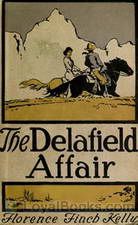 Delafield Affair
Delafield Affair
New Mexico's hot, dry winds are taking their toll: cattle suffer long treks to get food and water. But it is not just a hard time for them. Lucy Bancroft has sought a milder climate so she can recover from typhoid fever. She and her father stop to see Curt Conrad, a rancher, on their way to their new home. The two men discuss politics (some of it crooked) at the state level. they also talk about an easterner, a man named Delafield, who years earlier cheated Conrad's father out of his considerable wealth. Curt has vowed to seek revenge on Delafield if he can ever find the crook. thus begins a harrowing tale of determined search and blossoming love in the hot, dry climate of New Mexico. | |
By: Frances Hodgson Burnett (1849-1924) | |
|---|---|
 Haworth's
Haworth's
The story of an inventor's son, who tries to prevent him and a couple other characters from being taken into poverty by the man of the house who is drinking away the money, while trying to inherit their grandmother's money. - Summary by ej400 | |
By: Frances Trego Montgomery (1858-1925) | |
|---|---|
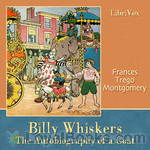 Billy Whiskers, the Autobiography of a Goat
Billy Whiskers, the Autobiography of a Goat
This delightful children's story can be enjoyed by kids and adults alike! A mischievous goat, Billy Whiskers, gets into trouble so often that the book could be named, "Billy Trouble Whiskers"! This humorous story will bring you many chuckles and give you a chance to get lost in Billy's adventures with childlike enthusiasm. From riding in a police car, to being a firehouse mascot, getting married, and finding himself a circus goat, Billy's adventures will certainly keep you entertained! (Introduction by Allyson Hester) | |
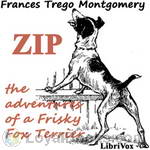 Zip, the Adventures of a Frisky Fox Terrier
Zip, the Adventures of a Frisky Fox Terrier
Zip, a little fox terrier, lives in the town of Maplewood in the house of his owner, Dr. Elsworth. Each day when Dr. Elsworth drives his carriage to visit his patients, Zip goes along with him so that he can keep the doctor company and, most importantly, visit with the other animals in the town. Zip likes to find out all the latest news so that he can tell it to his best friend, Tabby the cat, who also lives with Dr. Elsworth. However, he also finds himself getting into mischief, whether it's trying to solve a burglary, sneaking fried chicken from a picnic, getting stuck in a stovepipe or fighting with Peter-Kins the monkey. Zip is one dog who never has a dull day. | |
 Billy Whiskers at Home
Billy Whiskers at Home
This is one in the beloved series of Billy Whisker books. a lovable goat whose adventures always entertain. Of course, adventure for Billy usually means trouble. From the Brazilian bullfight and butting contests to what happens on Thanksgiving Day, there is always laughter. We won’t even talk about the ginger cookies! But then, Billy can also be a hero, along with his cat and dog friends, Stubby and Button, who save a life. - Summary by Larry Wilson | |
 Billy Whiskers Jr.
Billy Whiskers Jr.
This is one of the early Billy Whiskers books where he bears the title, “Junior.” Billy jumps the fence on the farm and heads west for adventures with sheep, wolves, cowboys and Indians, and meets a dog named Stubby who becomes his companion on this and future adventures. - Summary by Larry Wilson | |
 Billy Whiskers' Travels
Billy Whiskers' Travels
Running away from home is always bound to lead to adventures, some surprising and good and some not so pleasant. Follow Billy Whiskers when he encounters fireworks, tigers and dragons! Will this little goat ever get home again? - Summary by Larry Wilson | |
 Billy Whiskers in France
Billy Whiskers in France
Billy Whiskers is in France, but he is homesick. Of course, he makes new friends and entangles himself in many adventures. He has encounters with nurses, farmers, and a terrible wharf rat. Why is he at a dog cemetery? Why is there a submarine explosion? Join our favorite goat on his adventures in France. - Summary by Larry Wilson | |
 Billy Whiskers Out for Fun
Billy Whiskers Out for Fun
What our mischievous goat, Billy Whiskers and his friends Stubby & Button, think is fun may not be so for everyone else. But, they are off for fun at the fair, in the barnyard, in town, the circus, and even at a bridal supper. Then, what happens with the burglar in the cellar? - Summary by Larry Wilson | |
 Billy Whiskers at the Fair
Billy Whiskers at the Fair
Who doesn’t love a fair? Billy Whiskers, the mischievous goat sure does! When he leaves Cloverleaf farm his adventures take him to the laughing gallery, the balloon man, the pumpkin man and the fortune teller, and so much more. What does he do on his night with the Duke? - Summary by Larry Wilson | |
By: Francis Lovell Coombs | |
|---|---|
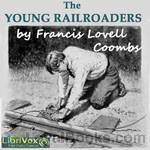 The Young Railroaders
The Young Railroaders
While aimed at youths, this series of tales of the just-opening West makes a rollicking good story for adults, too. Three teen-age boys, trained as telegraphers, manage to get themselves in and out of a wide variety of harrowing circumstances. Using their knowledge of Morse code, the science of telegraphs, and the operation of railroads, the boys stir in native resourcefulness, quick-thinking, and when the occasion demands it, raw courage – to effect rescues, thwart thieves, and solve mysteries. If Tom Swift had lived in the nineteenth century, he could not have had more exciting escapades! | |